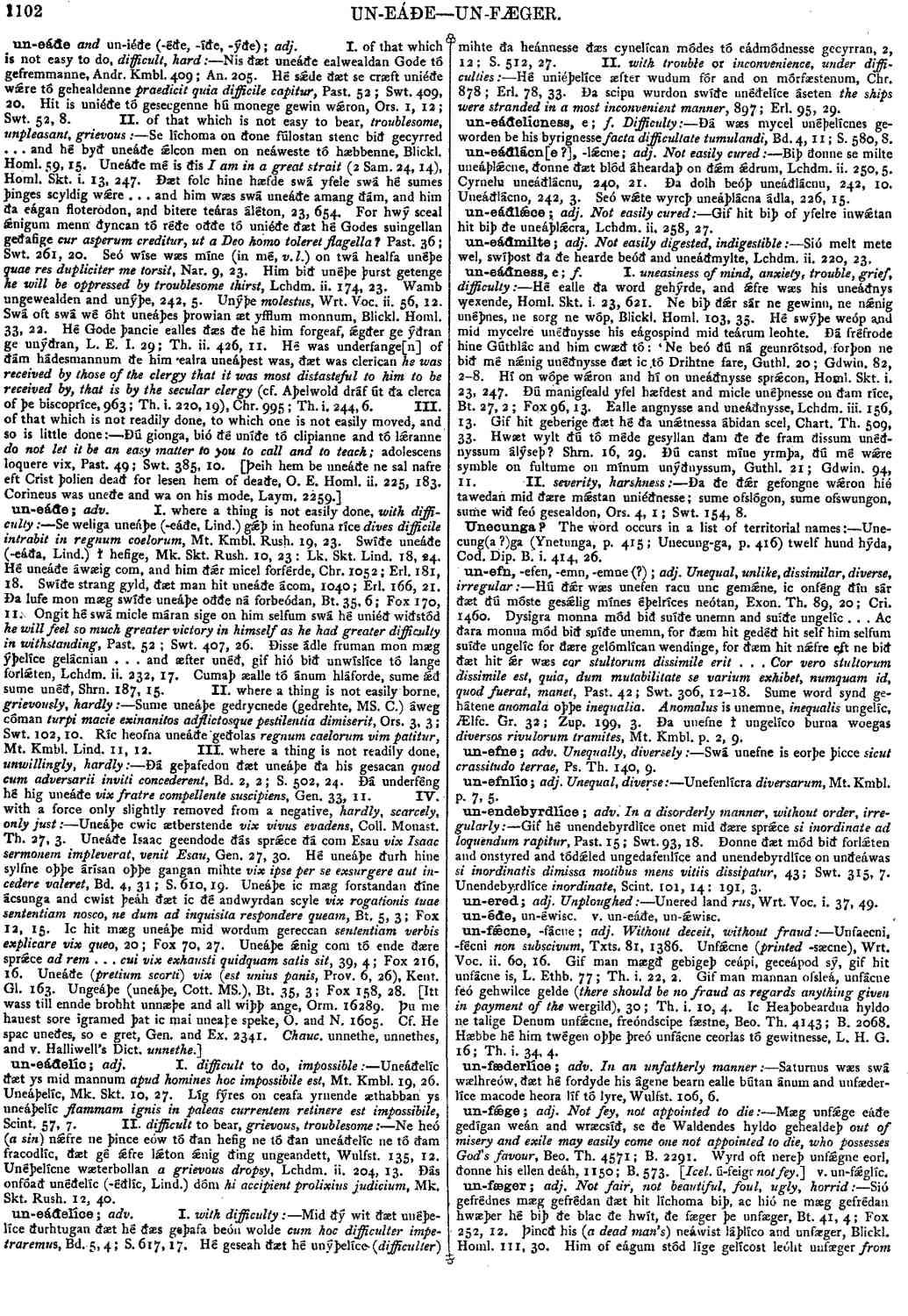un-eáðe
- adverb
-
Se weliga uneáþe (-eáðe, Lind.) gǽþ in heofuna ríce
dives difficule intrabit in regnum coelorum,
- Mt. Kmbl. Rush. 19, 23.
-
Swíðe uneáðe (-eáða, Lind.) ł hefige,
- Mk. Skt. Rush. 10, 23: Lk. Skt. Lind. 18, 24.
-
Hé uneáðe áwæig com, and him ðǽr micel forférde,
- Chr.1052 ;
- Erl. 181, 18.
-
Swíðe strang gyld, ðæt man hit uneáðe ácom,
- 1040 ;
- Erl. 166, 21.
-
Ða lufe mon mæg swíðe uneáþe oððe ná forbeódan,
- Bt. 35, 6 ;
- Fox 170, 11.
-
Ongit hé swá micle máran sige on him selfum swá hé uniéð wiðstód
he will feel so much greater victory in himself as he had greater difficulty in withstanding,
- Past. 52 ;
- Swt. 407, 26.
-
Ðisse ádle fruman mon mæg ýþelíce gelácnian ... and æfter unéð, gif hió bið unwíslíce tó lange forlǽten,
- Lchdm. ii. 232, 17.
-
Cumaþ æalle tó ánum hláforde, sume ǽð sume unéð,
- Shrn. 187, 15.
-
Sume uneáþe gedrycnede (gedrehte, MS. C.) áweg cóman
turpi macie exinanitos adflictosque pestilentia dimiserit,
- Ors. 3, 3 ;
- Swt. 102, 10.
-
Ríc heofna uneáðe geðolas
regnum caelorum vim patitur,
- Mt. Kmbl. Lind. 11, 12.
-
Ðá geþafedon ðæt uneáþe ða his gesacan
quod cum adversarii inviti concederent,
- Bd. 2, 2 ;
- S. 502, 24.
-
Ðá underféng hé hig uneáðe
vix fratre compellente suscipiens,
- Gen. 33, 11.
-
Uneáþe cwic ætberstende
vix vivus evadens,
- Coll. Monast. Th. 27, 3.
-
Uneáðe Isaac geendode ðás sprǽce ðá com Esau
vix Isaac sermonem impleverat, venit Esau,
- Gen. 27, 30.
-
Hé uneáþe ðurh hine sylfne oþþe árísan oþþe gangan mihte
vix ipse per se exsurgere aut incedere valeret,
- Bd. 4, 31 ;
- S. 610, 19.
-
Uneáþe ic mæg forstandan ðíne ácsunga and cwist þeáh ðæt ic ðé andwyrdan scyle
vix rogationis tuae sententiam nosco, ne dum ad inquisita respondere queam,
- Bt. 5, 3 ;
- Fox 12, 15.
-
Ic hit mæg uneáþe mid wordum gereccan
sententiam verbis explicare vix queo,
- 20 ;
- Fox 70, 27.
-
Uneáþe ǽnig com tó ende ðære sprǽce
ad rem ... cui vix exhausti quidquam satis sit,
- 39, 4 ;
- Fox 216, 16.
-
Uneáðe
(pretium scorti) vix (est unius panis, Prov. 6, 26),
- Kent. Gl. 163.
-
Ungeáþe (uneáþe, Cott. MS.),
- Bt. 35, 3 ;
- Fox 158, 28.
- Orm. 16289
- O. and N. 1605.
- Gen. and Ex. 2341
Bosworth, Joseph. “un-eáðe.” In An Anglo-Saxon Dictionary Online, edited by Thomas Northcote Toller, Christ Sean, and Ondřej Tichy. Prague: Faculty of Arts, Charles University, 2014. https://bosworthtoller.com/32890.
Checked: 1